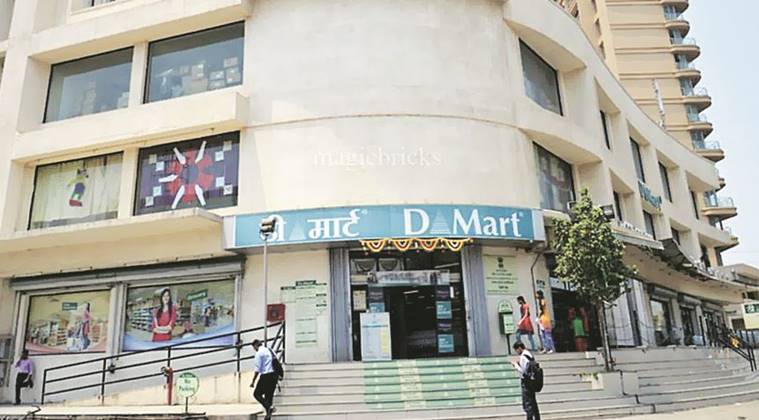Dmart Stores: Choice between ownership and leasing models key strategy for success
The firm has consistently followed ownership model or having them on 30-year long-term leases. As real estate leasing usually eats up 4-6% of revenues, the ownership model has kept costs low
 DMart plans to expand to new locations. For success, it will have to play a fine balancing act between the ownership model and the lease model. Express file photo
DMart plans to expand to new locations. For success, it will have to play a fine balancing act between the ownership model and the lease model. Express file photo
The recently closed Rs 1,870-crore DMart initial public offering (IPO) got listed at Rs 604.40 — a 102.14 per cent premium over its issue price of Rs 299 per share. It received bids for 463.61 crore shares, against the total issue size of 4.43 crore shares, recording a staggering 104.48 times oversubscription. Owner Radhakrishna Damani is understandably a happy man.
Damani and his family started DMart to address the growing need of Indian families for one-stop-shops for the daily requirements — groceries, vegetables and household goods, as well as electronics and apparel — at the lowest-possible prices.
Its focus on maintaining its presence in the low-margin business was a shrewd strategy which has worked well for the company. While the margins have been low, sticking to selling daily items has helped in achieving a quick inventory turnover.
This has, in turn, helped DMart maintain an excellent track record in its vendor payments. Industry insiders say that suppliers rush to them because they can expect payments from DMart outlets within 10-12 days — other retailers take up to 21 days to, at times, months for making payments.
DMart’s real estate strategy
Damani has focused on running the business he knows best in locations he knows best. From the launch of its first store in Mumbai’s Powai in 2002, DMart still has the highest number of stores in Maharashtra, followed by Gujarat, Andhra Pradesh, Madhya Pradesh, Karnataka, Telangana, Chhattisgarh and NCR.
DMart has consistently followed the ownership model, owning most of the stores or having them on 30-year long-term leases. Since real estate leasing usually eats up 4-6 per cent of revenues, the ownership model has kept costs low.
However, in its red herring prospectus filed with the Securities and Exchange Board of India, the company has mentioned that since the ownership model requires higher capital allocations, DMart might not be able to launch new stores at the earlier pace. The prospectus states: “As a new store location should satisfy various parameters to make an attractive commercial proposition, finalisation of location and property acquisition for our new stores is an evolving process which may not progress at the same pace as in the past or at the expected pace. Further, the ownership model requires greater capital for opening of each store, due to which we might not be able to expand at our historical rates. We may be required to obtain loans to finance such expansion and there can be no assurance that such loans will be available to us on commercially acceptable terms, or at all.”
In another section in the prospectus, it mentions: “We have no control over future increases in real estate prices. If real estate prices increase, we will require greater
capital to buy land or incur higher operational costs due to higher leasing or rental costs. If there is limited availability of real
estate in the future, competition for such real estate may increase which might result in a further increase in prices. This could lead to delays and cost overruns in opening new stores.”
The capital expenditure of the company (a large part of which has been towards purchase of freehold land, leasehold land and buildings) has been growing, as evidenced by the numbers filed in the prospectus (Rs 305.7 crore in FY14; Rs 439.9 crore in FY15 and Rs 666.8 crore in FY16).
A multi-format approach
DMart has followed three formats to set up new stores:
* Greenfield stores, where the company purchases land, constructs the store building and fits it out according to its requirements
* Buyout stores, where it purchases the land with ready building and fits them out as per its requirements, and
* Occupying properties on leasehold basis or rental basis
As a part of its strategy, the company proposes to utilise Rs 187.95 crore out of the net proceeds of the capital raised recently towards purchase of fit-outs for its new stores with an aggregate built-up area of 21 lakh sq ft and utilise Rs 178.65 cr to undertake construction of new stores with an aggregate built-up area of 9 lakh sq ft to be undertaken in FY18, FY19 and FY20.
The issue of capital requirement can be resolved through the equity raised. However, the land ownership model has inherent risks associated with it, which can include lack of proper title records, lengthy legal proceedings in case of law suits, overvaluation of land parcels, and delayed approvals for usage conversion.
Future moves
Going forward, DMart plans to expand to new locations. To ensure success, it will have to play a fine balancing act between the ownership model and the lease model for its stores. With all the inherent risks in land, as well as the lack of flexibility in relocation and expansion, leasing might be worth a closer look if fast track growth is a leading objective. However, maintaining margins could be a challenge, as lease rentals will continue to escalate at prime locations.
DMart has correctly chosen to establish and maintain its presence in highly populated middle income and lower middle income markets, as it works best for this business. These locations are typically high on lease rentals, too.
However, the foresight with which Damani has planned his real estate strategy will definitely serve him well. More than most, this savvy businessman and retailer has unfailing instincts that will guide his strategy on ownership and leasing.
The writer is managing director (retail services), JLL India





- 01
- 02
- 03
- 04
- 05


























